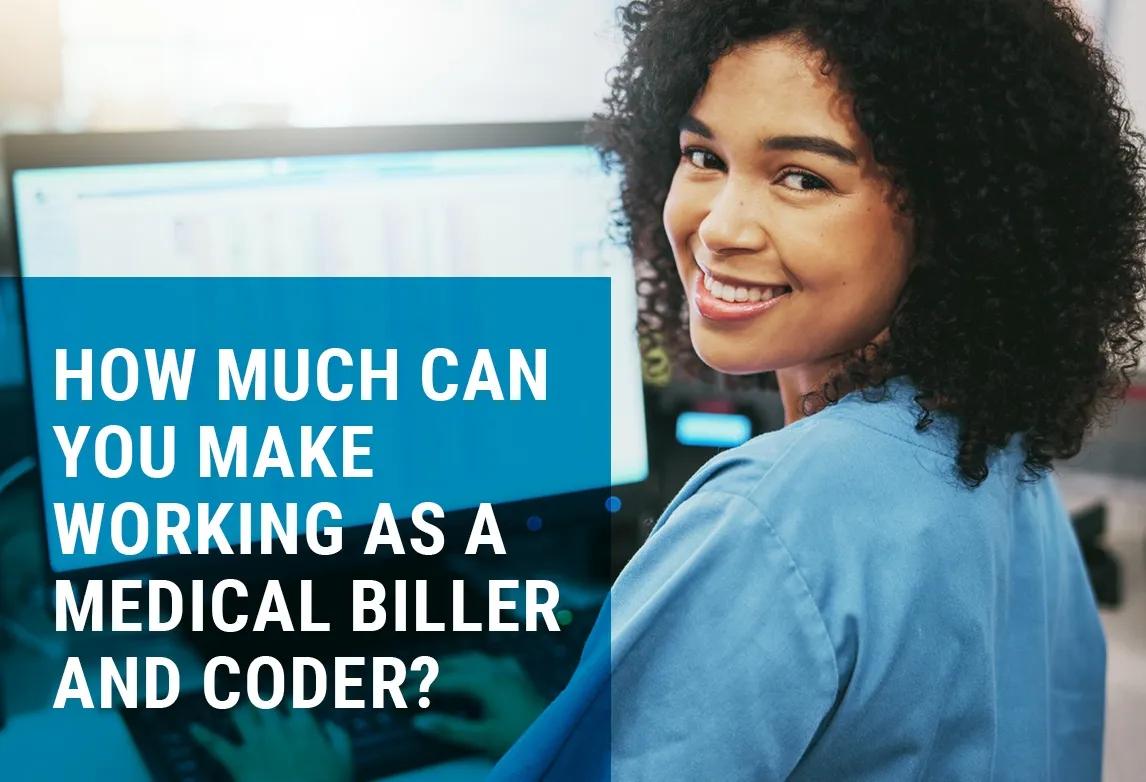What is a Medical Billing Specialist?

Medical billing and coding specialists are included under the broader U.S. Bureau of Labor Statistics (BLS) category of medical records and health information technicians. Collectively, this field has a projected 9% growth rate between 2020 and 2030, resulting in 37,100 jobs. Demand is projected to rise with the aging population’s need for more healthcare services combined with the use of electronic health records systems.
Every medical facility needs someone to do medical coding and medical billing for insurance and patient invoices. Doctors or office managers may perform these tasks in addition to their other responsibilities or they may hire one or more staff members to handle these duties.
Since clinical workers are focused on patient care, it often falls to trained specialists to manage the important administrative work of coding and billing. This can help healthcare providers get reimbursed for their services.
Does the idea of working as a medical billing and coding specialist sound appealing to you? Let’s take a look at what’s required to make it in this rapidly growing industry.
What Is a Medical Billing Specialist?
A medical billing specialist acts as a liaison between the medical office and insurance companies. What does this mean?
In simple terms, a medical billing specialist helps a healthcare facility manage insurance claims, invoices, and payments. They do this by taking the proper diagnosis and treatment codes and using them to submit patient claims to insurance companies for reimbursement, then billing the patient for any expenses that are not covered in full.
The Difference Between Medical Billing Coding Specialist vs Medical Billing Specialist
Job descriptions often combine billing and coding within a single position. However, they are technically two different job functions, each with its own responsibilities and tasks.
Medical offices may hire the same person to do both jobs, though larger facilities may divide the work into two separate positions. When this occurs, they hire both a medical coding specialist and a medical billing specialist. So, it’s important to understand the difference between the two roles.
The Medical Coder
Medical coding is the act of taking a provider’s diagnostic and procedural notes and converting them into the correct codes for record-tracking and billing purposes. The codes are industry-standard alphanumeric combinations used to identify the services being provided and billed. This will require knowledge of the different codes used:
- Current Procedural Terminology (CPT) – These codes are used to identify specific procedures and examinations performed.
- International Classification of Diseases (ICD-10) – These classification codes are used for medical diagnoses.
- Healthcare Common Procedure Coding System (HCPCS) – This system includes codes not covered in the previous two sets, such as codes for specific medical devices or supplies and non-physician services.
Each of these codes is used in insurance billing, and the coder must follow specific guidelines for proper use and placement in the billing software.
Codes may be entered as soon as the patient makes an appointment. There will be codes for the type of visit and the symptoms reported by the patient. Further codes will be applied for the symptoms observed by medical staff, tests and procedures performed, diagnoses, and treatments recommended.
The Medical Biller
After the coding is completed, medical billing specialists generate invoices and send the claims to patients’ insurance providers (or other payers). Based on these codes, insurance companies will approve or deny the requests for payment. Any remaining amount not covered by insurance will then be sent to the patient for payment.
The billing process often begins as soon as the patient makes an appointment with the medical office, as codes may be entered and submitted to an insurer for pre-approval. This helps determine what the patient’s out-of-pocket expenses will be, so the office can charge the patient for that amount at the time of the visit.
A medical biller needs to understand the industry codes even if someone else does the coding, since the billing specialist has to review the reasons behind any denied insurance claims and may be responsible for updating the codes before resubmitting the claims. They will also verify the codes are entered correctly before submitting the initial claim.
Once the insurance billing is settled, the remaining balance will be invoiced to the patient. This process also falls to the medical billing specialist. Medical billers also determine co-pay requirements, track the payments, and follow up on outstanding payments from insurance companies and patients.
If a bill goes unpaid, the billing specialist will need to contact the insurance companies and make sure all the paperwork is in order. If a patient does not submit payment for an outstanding bill within a specified timeframe and does not respond to further requests, the billing specialist may need to turn the debt over to a collection agency.
What Does Medical Billing and Coding Involve?
Medical billing and coding involves using standardized codes to input a patient’s diagnoses and services into an electronic health record system. These codes tell the patient’s insurance company how much it needs to reimburse the healthcare provider under the terms of the patient’s policy. It also reveals the portion of the payment due that is the patient’s responsibility.
Medical Biller and Coding Duties
The day-to-day work of a medical billing and coding specialist includes:
- Properly coding services, procedures, diagnoses, and treatments
- Preparing and sending invoices or claims for payment
- Correcting rejected claims
- Tracking payments
- Following up with patients and insurance companies about outstanding bills
While these workers often work in the same healthcare facility where patients go for treatment, this is primarily an office job as opposed to patient-facing clinical work. A medical billing and coding specialist will spend a large amount of time at the computer, reviewing, entering, and updating information.
Medical Billing and Coding Job Description
A typical medical billing and coding job post contains information an applicant would need to know before deciding whether or not to apply for the opening. This includes:
- A job summary
- Primary duties expected of the medical biller and coder
- Any required qualifications (education and experience)
- Any required certifications
Additional Medical Biller and Coder Requirements
While job titles and descriptions may vary for medical billing and coding specialist careers, the basic requirements will often be the same. Familiarity with the necessary codes is the most important requirement, but there are other knowledge areas that can increase your ability to get hired.
- Medical Terminology
To code properly, a basic understanding of medical terminology is essential. This includes anatomy and physiology terms, diagnosis and procedural terminology, etc. Understanding the most commonly used terms in the medical profession will help with the billing and coding process.
- Basic Math Skills
You will need to have a fundamental understanding of basic arithmetic to determine the proper billing amounts. While the billing system may automatically populate forms with the proper amounts for insurance claims based on the codes entered, you may need to calculate the remaining amounts due from patients or set up payment plans where applicable.
- Computer Skills
The medical billing and coding process requires a working knowledge of computer systems and relevant medical software. The ability to learn new programs is also a plus.
- Communication Skills
Part of the medical billing process may involve contacting patients for payment. The ability to communicate effectively and professionally is necessary for this aspect of the job. Some patients may be stressed, upset, or angry when faced with medical problems and a large bill, so good communication skills can help make these conversations a little easier.
- Use of Basic Office Equipment
In addition to having a level of computer proficiency, a medical billing and coding specialist will need to be able to use other basic equipment, such as a 10-key calculator, printer, copier, scanner, phone system, and the like. If you have ever worked in an office setting, you have likely used these tools and should have no problem.
Medical Coding Certification
While certification is not required by every employer to get a job as a medical billing and coding specialist, having industry certification can make it easier to get a job. Medical coding certification may also increase your earning potential.
The BLS reports that the median salary for a medical records and health information technician, under which medical billers and coders fall, was $45,240 per year in 2020. If you earn industry certification, however, such as the Certified Professional Coder (CPC®) credential from the AAPC then gain years of experience, you could earn more.
While work experience and other eligibility requirements are necessary for full CPC certification, those who pass the exam but lack the requisite experience may be awarded the CPC Apprentice (CPC-A) designation. Upon submitting proof of two years of on-the-job experience or 80 contact hours of a coding preparation course plus one year of experience, a CPC Apprentice may attain full CPC status.
With a combination of formal education, certification, and experience, your earning potential can increase, especially as you move into senior-level or supervisory roles.
A medical office will often require either experience or certification to hire a new billing and coding specialist, and some may require (or prefer) candidates to have both. Earning a diploma or degree in medical billing and coding can help you gain the required knowledge while getting you ready for the certification exam.
Who Is a Good Fit for a Medical Billing and Coding Career?
A medical billing and coding specialist requires good organizational skills. If you are a detail-oriented professional who is able to manage time well and adeptly handle multiple projects, a job in medical billing and coding might be a good fit for you.
Candidates should also be comfortable in an office setting, as the job requires a lot of time in front of a computer screen and working with patients’ files. It’s important to have a good grasp of medical terminology or at least be willing to learn it. Workers in this field will also need to stay up to date with changes in procedures and coding guidelines, so an interest in continued learning is also a good quality for this role.
If this description sounds like you, you might be interested in training in a medical billing and coding specialist program to begin your career path.
Getting Started in Medical Billing and Coding
Would you like to take advantage of the growth potential in the medical billing and coding industry?
You can get started with an online diploma or degree in medical billing and coding from Ultimate Medical Academy. Not only can your UMA education lead to a credential, but it can also prepare you to take the CPC certification exam, provided that you meet the qualifications.
Once you pass the exam, you can earn the CPC-A designation, which can be updated to full CPC status upon meeting eligibility requirements.
Are you ready to become a medical billing and coding specialist? Contact us today for more information on our online diploma and degree programs.
FAQs
What does a medical billing specialist do?
A medical billing specialist submits claims to insurance companies for reimbursement according to a patient’s policy terms. Medical billers also submit bills to patients for their portion of the services rendered, recording these payments once they are received.
How long does it take to become a medical billing specialist?
Every training program sets its own program length. The amount of time it takes to become a medical billing specialist also differs based on whether you earn your diploma or degree. For example, Ultimate Medical Academy offers both a Medical Billing and Coding diploma and associate degree. The diploma program takes 11 months to complete and the associate degree program takes approximately 18 months.1
How much does a medical billing specialist get paid?
The role of medical billing specialist falls under the Bureau of Labor Statistics’ (BLS) medical records and health information technician job functions. According to the BLS, individuals performing this type of work earn an median salary of $45,240 per year. However, actual pay varies based on your level of education, experience, certifications, geographical location, and a variety of other factors.
How do you become a medical billing specialist?
While some healthcare agencies will hire a medical billing specialist with a high school diploma and previous experience, the Bureau of Labor Statistics (BLS) reports that, generally speaking, additional education is required. This education involves learning about medical terminology, anatomy, coding systems, healthcare reimbursement, and computer systems. The BLS adds that many employers also require that medical billing and coding specialists be certified, and that certification is provided by AAPC.
What does a medical coder do on a daily basis?
A medical coder is tasked with updating patient records, coding their diagnoses and procedures via standardized coding systems. These codes are then used to submit claims to insurance companies so the provider can be reimbursed according to the patient’s policy. So, what a medical coder does on a daily basis is review patients’ files to ensure that the proper code is assigned, as well as to verify that the file’s documentation matches the code.
1 Completion times may vary depending on the individual student.
Request Information
Talk with us. Start your journey.
Complete this form and we'll call you to explore options at UMA and answer your questions. We'll also email you info on how to get started. We're with you at every step!
Request Information
Talk with us. Start your journey.
Complete this form and we'll call you to explore options at UMA and answer your questions. We'll also email you info on how to get started. We're with you at every step!
About the Author
 Adam Fenster
Adam FensterAdam Fenster is a senior copywriter at Ultimate Medical Academy, with journalism experience from his time as a reporter and editor for multiple online and print publications. Adam has been covering healthcare education since 2019, with an emphasis on topics such as wellness, healthcare employment, and job preparedness. He received his BA in journalism from the University of South Florida.
Related Content


